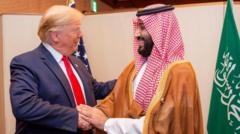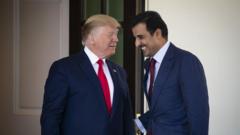**As nearly all political parties push for varying degrees of autonomy, the influence of U.S. foreign policy looms large over the polls.**
**Greenland Votes Amid Trump Tensions: Independence on the Ballot**

**Greenland Votes Amid Trump Tensions: Independence on the Ballot**
**Amid heightened interest from President Trump, Greenland prepares for a pivotal election on independence from Denmark.**
In a historic election set for Tuesday, Greenland's residents are making their voices heard on the contentious issue of independence from Denmark. Unlike previous years where such votes garnered little attention, this election faces unprecedented scrutiny due to U.S. President Donald Trump's ongoing interest in acquiring the Arctic territory.
Greenland has been a dependent territory of Denmark for the past 300 years, managing its own domestic affairs while foreign policy decisions are controlled by Copenhagen. Recent developments, however, have catapulted the debate over independence into the forefront, with all but one of the six political parties campaigning for some form of emancipation. The debate, ignited by Trump’s acquisition proposals in 2019, has gained traction, leading to polarized opinions about the urgency and approach to independence.
“This election shines an enormous spotlight on Greenland,” remarked Nauja Bianco, a policy analyst. The U.S. president's assertion during a congressional address last week that "we need Greenland for national security" resonates deeply with Greenlandic politicians, who find his demeanor dismissive of their autonomy. Greenland's Prime Minister Mute Egede has expressed concerns over respect and treatment, reinforcing the desire for independence with statements against historical colonial grievances.
The political landscape is characterized by differing strategies toward independence. Egede’s party, Inuit Ataqatigiit (IA), advocates for a gradual approach to autonomy, prioritizing citizen security, while opposition party Naleraq calls for immediate separation and closer ties with the U.S. Naleraq’s position allows it to gain popularity among voters discontent with Denmark, with party leader Pele Broberg arguing a swift divorce could happen within three years.
Despite rising calls for independence, there remains a significant level of wariness among Greenlanders about potential economic repercussions. While up to 80% support future statehood, many are apprehensive about any challenges to their living standards and view Trump's interest with skepticism. Results are expected early Wednesday morning, though experts predict a clear path to independence could take a decade or more, requiring extensive negotiations and public referendums.
In a challenge to the local narrative, other pressing issues such as healthcare and social welfare have been sidelined as discussions of independence take center stage. Experts remain cautious, noting that most Greenlanders fear a swift shift away from Denmark could invite another form of external control.
In summary, the significance of this election extends beyond local politics, intertwining with global geo-political interests and the legitimacy of self-determination. The outcome may not just define Greenland's immediate future but could also impact broader Arctic dynamics, influenced heavily by the interactions with international powers, particularly the United States.
Greenland has been a dependent territory of Denmark for the past 300 years, managing its own domestic affairs while foreign policy decisions are controlled by Copenhagen. Recent developments, however, have catapulted the debate over independence into the forefront, with all but one of the six political parties campaigning for some form of emancipation. The debate, ignited by Trump’s acquisition proposals in 2019, has gained traction, leading to polarized opinions about the urgency and approach to independence.
“This election shines an enormous spotlight on Greenland,” remarked Nauja Bianco, a policy analyst. The U.S. president's assertion during a congressional address last week that "we need Greenland for national security" resonates deeply with Greenlandic politicians, who find his demeanor dismissive of their autonomy. Greenland's Prime Minister Mute Egede has expressed concerns over respect and treatment, reinforcing the desire for independence with statements against historical colonial grievances.
The political landscape is characterized by differing strategies toward independence. Egede’s party, Inuit Ataqatigiit (IA), advocates for a gradual approach to autonomy, prioritizing citizen security, while opposition party Naleraq calls for immediate separation and closer ties with the U.S. Naleraq’s position allows it to gain popularity among voters discontent with Denmark, with party leader Pele Broberg arguing a swift divorce could happen within three years.
Despite rising calls for independence, there remains a significant level of wariness among Greenlanders about potential economic repercussions. While up to 80% support future statehood, many are apprehensive about any challenges to their living standards and view Trump's interest with skepticism. Results are expected early Wednesday morning, though experts predict a clear path to independence could take a decade or more, requiring extensive negotiations and public referendums.
In a challenge to the local narrative, other pressing issues such as healthcare and social welfare have been sidelined as discussions of independence take center stage. Experts remain cautious, noting that most Greenlanders fear a swift shift away from Denmark could invite another form of external control.
In summary, the significance of this election extends beyond local politics, intertwining with global geo-political interests and the legitimacy of self-determination. The outcome may not just define Greenland's immediate future but could also impact broader Arctic dynamics, influenced heavily by the interactions with international powers, particularly the United States.






















